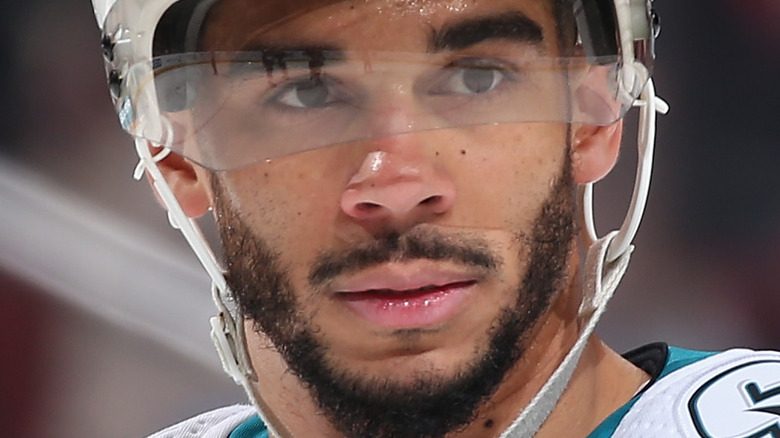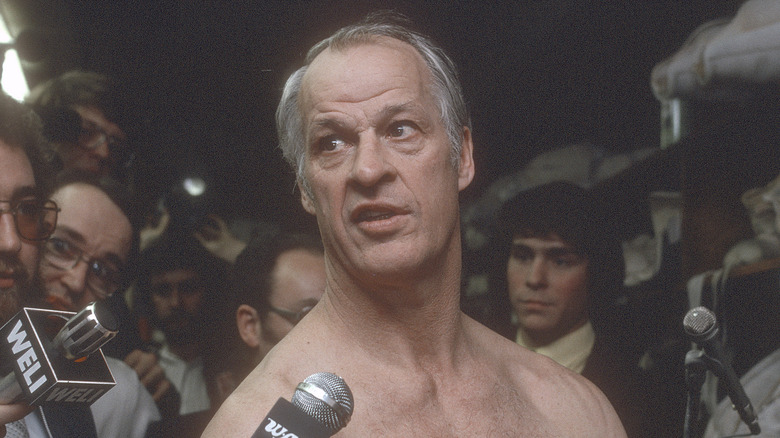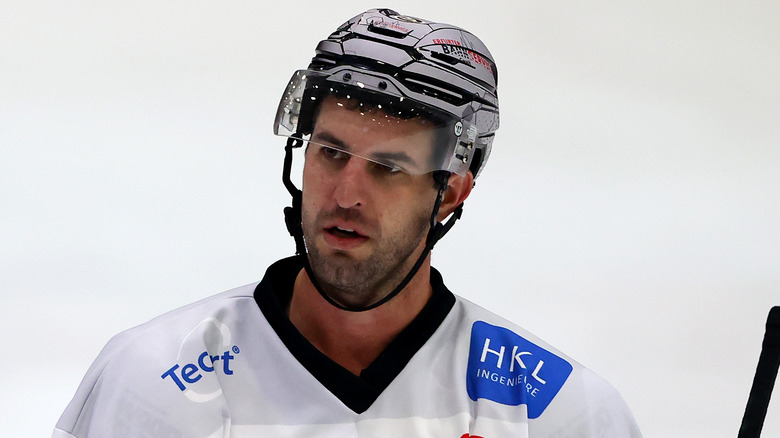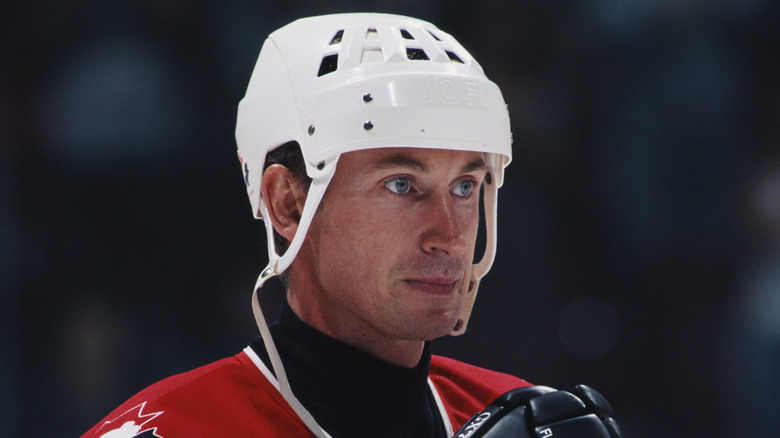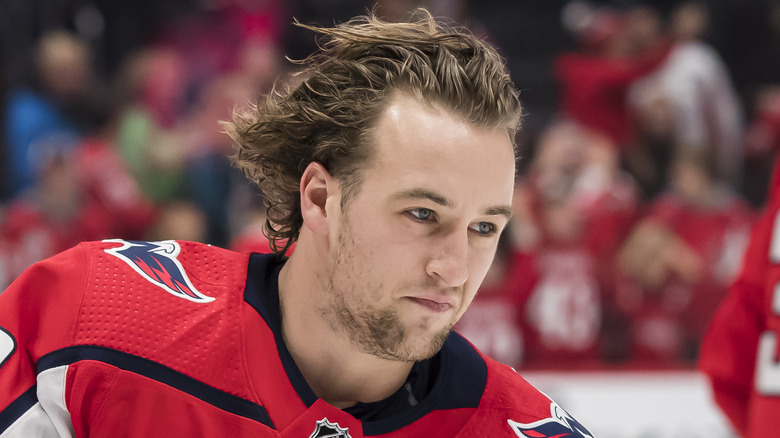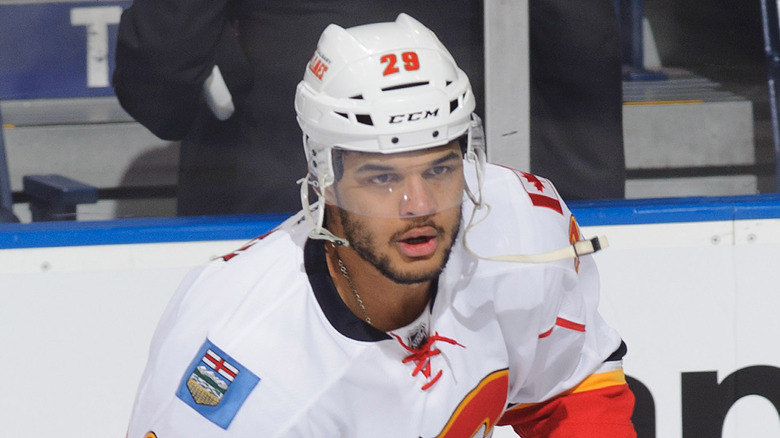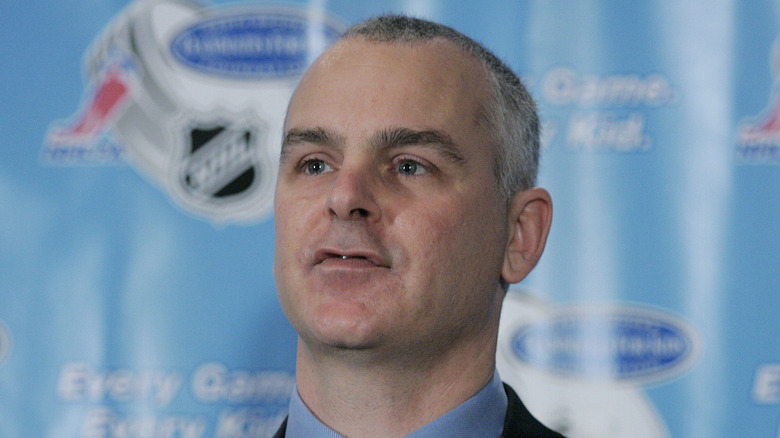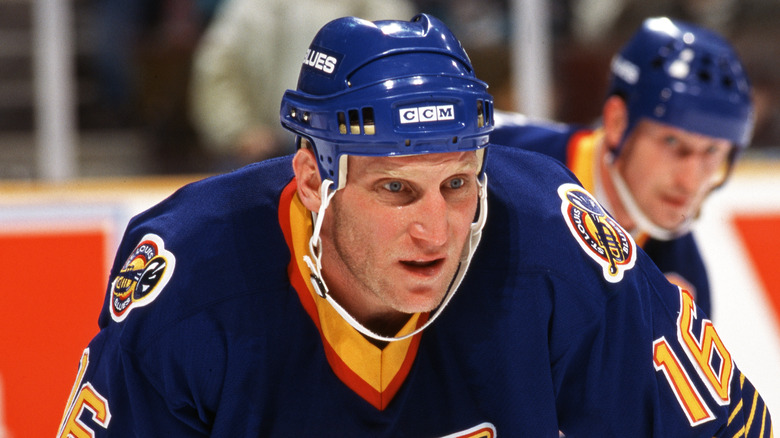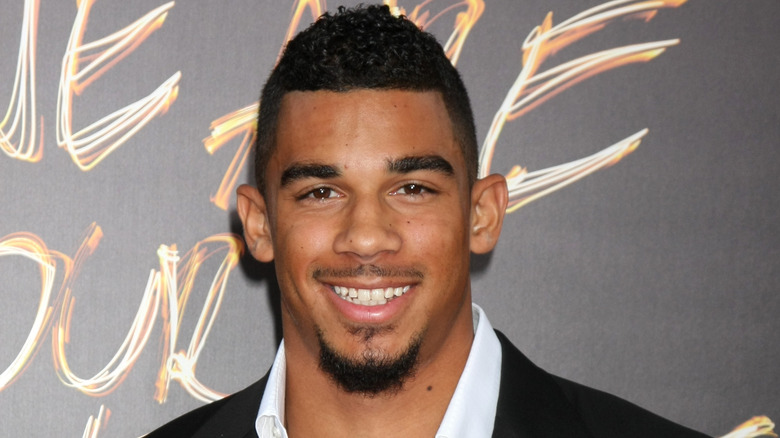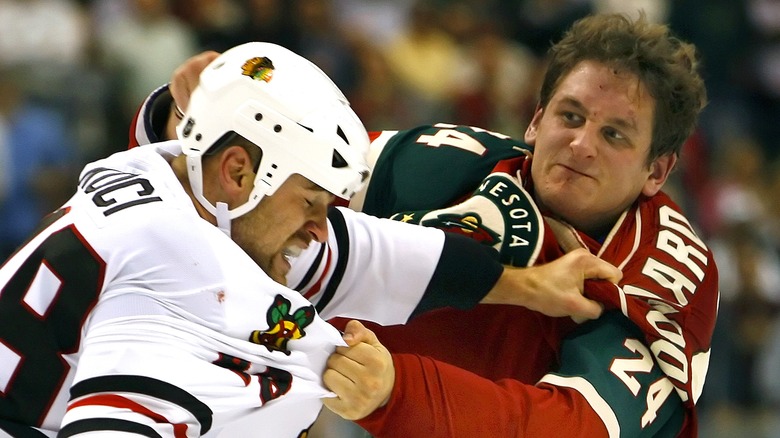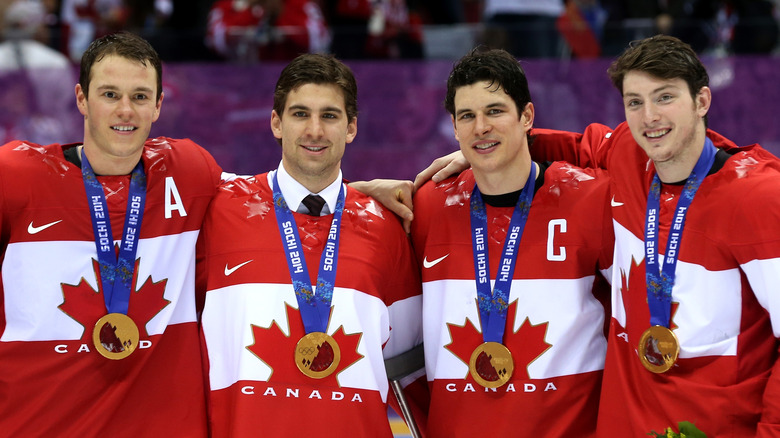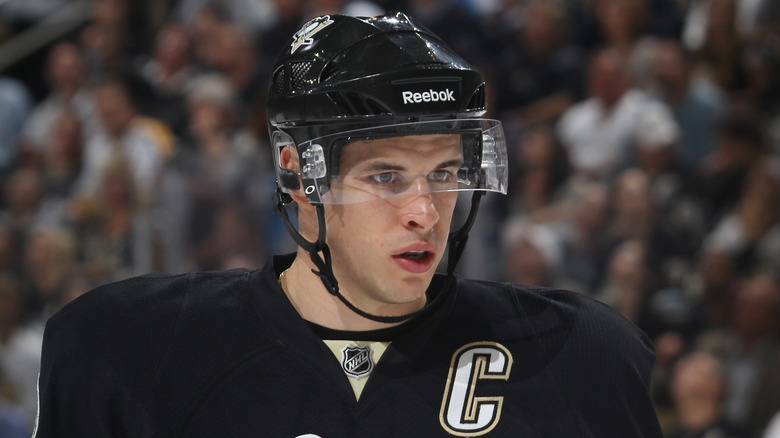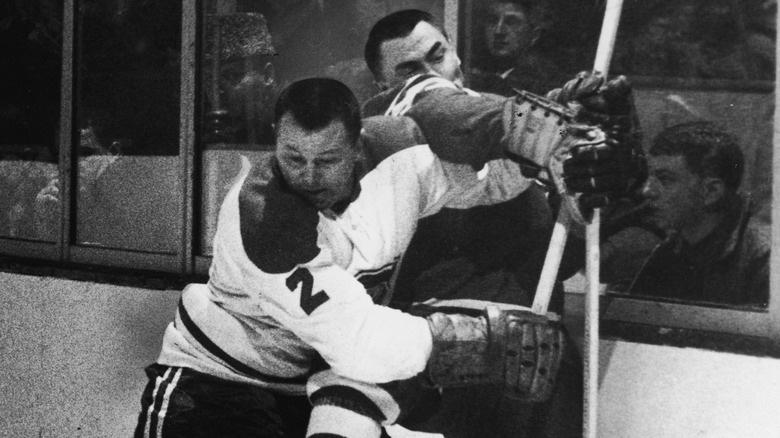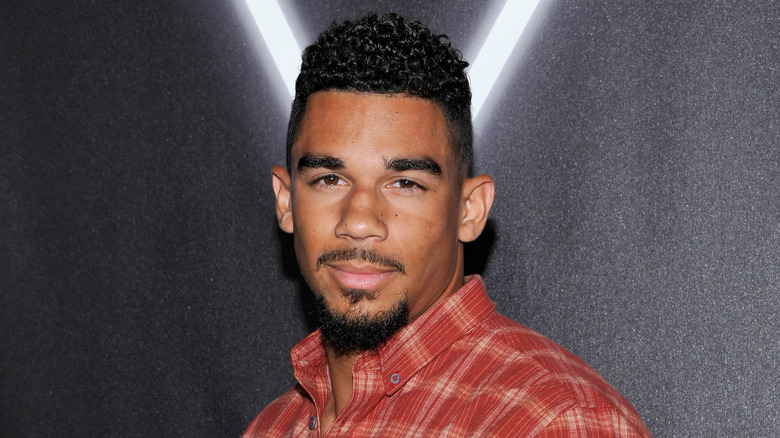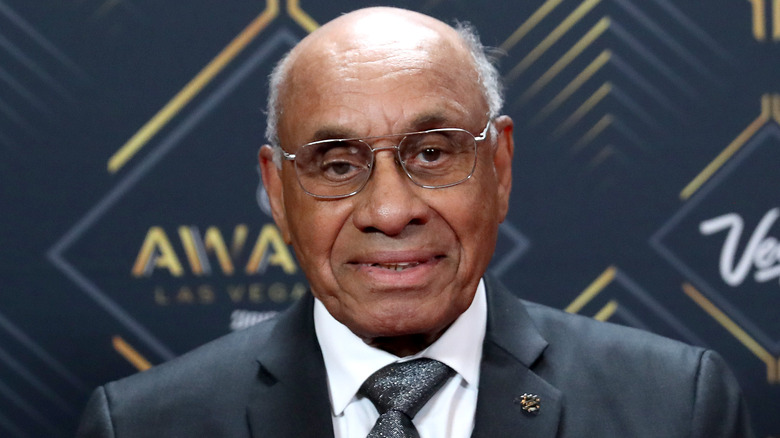Secrets The NHL Tried To Hide
Modern hockey started in England in the mid-18th century, though formal rules weren't drafted until 1876. At the 1908 games in London, hockey made its Olympic debut, per the FIH, and by 1917, the NHL hosted its first games, History recapped. The league opened the door for superstars, like Gordie Howe of the Detroit Red Wings and Bobby Orr of the Boston Bruins. These men paved the way for the next generation of stars, including all-time greats Wayne Gretzky and Mario Lemieux, per Bleacher Report. Players continued to make history in the fast-paced league, with every team aiming to win the Stanley Cup, which is constantly guarded by the "Keeper of the Cup."
The league again made history in 2021 — albeit in a different way. In the face of a surge in the COVID-19 pandemic, the NHL became the first major sports league to suspend all play and shut down its facilities, Forbes reported. Immediately after, the NHL announced that its players would not participate in the 2022 Beijing Olympics. Fortunately for fans back in North America, the players came back to the ice and continued to show off their incredible speed and skill.
For much of its history, however, the NHL has been front and center in controversial calls. From on-ice brutality to off-ice scandals, many of the league's biggest players and most influential executives have found themselves on thin ice with the public. Grab your skates for a look at the secrets the NHL tried to hide.
Its opinions on banned substances
While other major sports leagues have been rocked by doping scandals, like the MLB after the Mitchell Report, the NHL has seemed to avoid any such major controversies. While some may take this to mean professional hockey players don't use as many drugs as other sports stars, that actually may not be the case.
In fact, the NHL may just be turning a blind eye to the issue. One requirement of the league is that — in the five month period between the start of the postseason and the start of next season's training camp — players could not be drug tested, and they could only be subjected to (at most) two random drug tests from the start of training camp through the end of the regular season. According to the National Hockey League Players' Association, testing is limited so players could avoid "potential distraction," via Bleacher Report.
NHL players have a mix of opinions about these drugs. "I think there probably was a time where it was being used a lot, but it's never really talked about," Edmonton Oilers star Connor McDavid told ESPN. "If you don't have people clamoring for stricter drug testing and nobody cares ... you're not going to have reform," a professor and performance enhancing drug expert believed. The NHL ultimately changed its policies, conducting tests in the postseason and offseason, however, the new rule was limited, as only a maximum of 60 players would be randomly selected for testing.
The accepted violence in the NHL
Professional hockey has a complicated relationship with on-ice fights. The International Ice Hockey Federation forbids fighting in games, including the Olympics, via USA Today. As for the NHL, fighting has long been an accepted part of the game, like when all-time great Gordie Howe spawned the "Gordie Howe Hat Trick" — when a player scores a goal, gives an assist, and gets in a fight all in one game, per Bleacher Report.
Another example is the "Broad Street Bullies," the nickname of the Philadelphia Flyers from 1974 to 1976. The team was known as much for its offensive prowess as it was for its willingness to fight, even if it meant minutes in the penalty box, The Hockey Writers recapped. In the next decade, enforcers started to become a regular part of the NHL. These players were known for their aggressive styles and would rarely back down from a fight, USA Today reported.
Even in 2020, the NHL still faced backlash for seemingly promoting violence in the league. A video for the Stanley Cup final that was later deleted appeared to promote injuries as a necessary part of the game. "To hoist the Stanley Cup, there is a price to pay," the NHL tweeted, via The New York Times. Though some efforts have been implemented to reduce fighting in the league, the NHL commissioner, Gary Bettman, never banned the practice as of 2022. He considered fighting a necessary "thermostat," per The New York Times.
Ignoring a damaging accusation
The Chicago Blackhawks are one of the original six franchises in the NHL and have a long history of winning. This was especially true in the early aughts, when the franchise won three championships in six years, hoisting the Stanley Cup in 2010, 2013, and 2015, per The New York Times. Behind the victories, sadly, was a much darker tale.
In 2010, minor league player Kyle Beach accused the Blackhawks' video coach Brad Aldrich of sexually assaulting him. However, franchise executives didn't fully investigate the claims because they were concerned any negative press would distract the team from their championship season, The New York Times reported. As a result of no punishment, Aldrich then made a sexual advance towards an intern for the Blackhawks. Aldrich resigned after the season and continued on to work for high school and college hockey programs. The franchise came under scrutiny for its misdeeds in 2021 when Beach filed a lawsuit against the Blackhawks for his encounter with Aldrich. Initially, the franchise dismissed Beach's story and claimed that it had no merit, though they did conduct an independent investigation. As a result, the NHL fined the Blackhawks $2 million for "inadequate internal procedures and insufficient and untimely response."
In December 2021, the Blackhawks and Beach reached a settlement on the lawsuit between the two parties. "The Blackhawks hope that this resolution will bring some measure of peace and closure for Mr. Beach," the team said in a statement, per ESPN.
If you or anyone you know has been a victim of sexual assault, help is available. Visit the Rape, Abuse & Incest National Network website or contact RAINN's National Helpline at 1-800-656-HOPE (4673).
The league's history of hazing
The NHL is known for hazing its rookies with bad haircuts and other traditions to introduce new players to the league. Despite some players thinking these pranks were good, clean fun, the scenarios could easily get out of hand — and sometimes did. In 1988, the Los Angeles Times even wrote a piece highlighting that the league's hazing was an "embarrassment," via Bleacher Report.
Former NHL player Ryan Johnson said he experienced the toxic cultures throughout his entire career and all levels of hockey. "I've played a lot of different sports and there's more hazing in hockey than in any other sport," he told ESPN. "I don't know if it's because the sport is more blue-collar, or because a lot of guys are straight off the farm or whatever. But it's just one of those sports." Even Wayne Gretzky was reportedly hazed in his early days.
The University of Vermont suspended four of its players in 2016 for a hazing incident, the Burlington Free Press reported. This was the second hazing controversy in the school's hockey history. In the 1999-2000 season, the university canceled all remaining games after another hazing scandal. A former player filed a lawsuit against the school, claiming he was forced into "degrading activities" as a member of the men's hockey team. After conducting an investigation, school officials found out that some of the hockey players lied about the accusations and put an end to the season, per The New York Times.
The toxic words from NHL players
Women and hockey go together, as shown by its increasing popularity of the game on an international level. The women's professional league, the Premier Hockey Federation, talked about expanding teams following the 2022 Olympics, per NBC. Within the NHL however, some players were caught sending inappropriate comments about women to one another, creating a culture of misogyny in the league. A particularly troubling discussion was revealed when someone hacked an Instagram group chat featuring Brendan Leipsic of the Washington Capitals and Florida Panthers prospect Jack Rodewald, then posted the discourse online. In the exchange, Leipsic commented on the physical appearances of several wives and girlfriends of other NHL players. He also referred to his teammates Garnet Hathaway and Nic Dowd as "losers," reported the CBC.
In addition to alluding that he enjoyed using cocaine, Leipsic referred to women as "animals" and a "thing" meant to be conquered, via The Washington Post. Leipsic apologized on Twitter for what he called offensive and inappropriate remarks. The Capitals said it would handle the matter internally and the league released a statement on the comments. "There is no place in our league for such statements, attitudes and behavior, no matter the form," the NHL said, via The New York Times. "We will address this inexcusable conduct with the clubs and players involved."
Following the scandal, the Capitals released Leipsic from the team. He went on to play hockey in Russia, the CBC reported.
Incidents of racism in hockey
Hockey has long been a melting pot of cultures, but despite the wide range of player nationalities, this didn't always mean players had positive experiences. For example, former NHL player Akim Aliu wrote a 2020 article in The Players' Tribune about his experiences as a minority in the league. Aliu's father was Nigerian and his mother Ukrainian. He described how — starting with his teenage years in a junior hockey league with the Windsor Spitfires — some teammates treated him differently for the way he talked and dressed. In one incident, he refused to participate in a hazing ritual. As a result, his older teammate and future NHL player Steve Downie "shoved his fiberglass stick through my mouth. I lost seven teeth in half a second," Aliu recounted. He referred to Downie as a" racist sociopath."
Details of the situation made the news and, according to Aliu, many in hockey condemned his decision to discuss the issue, considering him to be "the kid who wouldn't go along with it." His troubling experiences as a professional hockey player also made him not believe the title of the NHL's diversity campaign, "Hockey is For Everyone." Aliu called for changes to the NHL and an end to "the racism, misogyny, bullying and homophobia that permeates the culture of hockey."
In response, the NHL posted a promise on Twitter to look into the "repugnant and unacceptable" behavior that Aliu described. In 2020, the NHL announced different initiatives to combat racism.
The short tenures of union leaders
Ted Saskin became the executive director of the National Hockey League's Players' Association, the NHLPA, to represent the league's players. Yet, only two years into his contract, he was fired. The NHLPA executive board voted Saskin out after he was involved in a controversy with Ken Kim, the NHLPA's senior director. Both men were accused of monitoring player emails, per The Hockey News.
Popular player Chris Chelios from the Detroit Red Wings was on the NHLPA committee and reportedly led the charge to get rid of Saskin. Chelios said after the decision, "it was a [sic] unanimous vote today, which was nice," per the CBC. Originally, Chelios and other players filed a lawsuit against Saskin, claiming that he lied in contract discussions and "illegally diverted tens of millions of dollars in union funds for his own benefit." The lawsuit was rejected, but prompted a further look into Saskin and Kim. After an investigation, Saskin was found to be surveilling players through email "for an extended period of time" for his personal interests. "I remain proud of all the work I did for NHL players over the last 16 years," Saskin said after his dismissal in 2007, the CBC reported.
Following Saskin, the player's union had a tough time keeping a leader. In 2009, the NHLPA once again dismissed its executive director. Paul Kelly's departure meant the top spot was open for the fourth time in four years, according to The New York Times.
The controversial call to end a season
Bobby Hull was one of the all-time greats in the NHL, having made a dozen All-Star appearances. He also had a cool nickname, "The Golden Jet." The Hull name continued in the NHL when his son, Brett Hull, joined the league and showed his equally impressive skills, per Bleacher Report. Even though Brett became a star on his own merit, he may be most remembered for a critical and controversial NHL call. In the 1999 Stanley Cup, Brett scored a triple overtime goal to give his team, the Dallas Stars, its first championship. Brett said of the special moment, "To go out and score the goal in overtime; who hasn't sat as a kid on the ice with his buddies and dreamt or pretended that's the goal they've scored? To do it in real life was something special."
Only, the final goal should not have counted — at least according to certain NHL fans and historians (this call is still hotly debated among them). When Brett shot the winning goal, his foot had crossed into the goalie crease, while the puck was outside of it. According to the NHL rules, which had recently changed, the goal should have been waved off. In fact, the league "strictly enforced this new rule all season long, including overturning similarly scored goals like Hull's," according to Bleacher Report.
However, after the game, the NHL reviewed the goal and concluded it counted, since Brett had possession of the puck.
Evander Kane's troubled past
Even though Canada has the reputation of its residents being extremely nice, that doesn't always extend to hockey. As a member of the Winnipeg Jets, NHL player Evander Kane was once fined for texting while driving in Canada. Later that year, he received another fine, that time for driving with an invalid license. Kane didn't pay his pile up of fees and ultimately, the Jets paid for the tickets. Kane paid his club back and claimed he had no recollection why he was pulled over, CBC reported.
Around the same time, Kane allegedly attacked a man in Vancouver. A resident of the city claimed Kane, also from Vancouver, assaulted him. The victim claimed he suffered "permanent physical disability" from what he called an unprovoked attack, CTV reported. Kane didn't comment directly on the lawsuit from the resident, but said he wasn't surprised because in his opinion, "Playing in the Canadian market, every little thing becomes a big thing."
Kane once again made the news in 2021 for shady behavior. As a member of the San Jose Sharks, he was caught using a fake vaccine card. As a result, the NHL suspended Kane for 21 games, per The Washington Post. Kane also faced two lawsuits from different women. One accuser said Kane assaulted her in a hotel room. In the other lawsuit, his ex-girlfriend claimed the NHL star promised her a big payday to have an abortion but never paid, Radar Online reported.
If you or anyone you know has been a victim of sexual assault, help is available. Visit the Rape, Abuse & Incest National Network website or contact RAINN's National Helpline at 1-800-656-HOPE (4673).
The effect of the game on players
Fans of hockey love the lightning fast action and slapshots by the highly skilled stars of the NHL. However, the intense pace and hard hits can have a lasting toll on players, resulting in both physical and emotional damage.
For example, Bob Probert was a notoriously tough enforcer in the NHL, known to get into fights during matches. In 2010, when he was only 45 years old, he died from a heart attack. Though he admitted to heavy drinking and previously using cocaine, his time in the NHL may have cost Probert his life. Looking into his death, Boston University researchers found that Probert had severe damage to his brain. Fighting and hits to the head potentially contributed to brain trauma and ultimately his death, per The New York Times. At the time, the deputy commissioner of the NHL, Bill Daly, said that while he was tracking Boston University's studies on brain trauma in professional sports, "We can't take steps tomorrow based on what we're finding out today."
Another tragic death in the NHL occurred one year later with Derek Boogaard, a popular player for the New York Rangers. He accidentally overdosed from a combination of painkillers and alcohol in 2011. Later, doctors discovered that he had suffered from a "chronic traumatic encephalopathy, or C.T.E.," The New York Times reported. The "brain degeneration likely caused by repeated head traumas" per Mayo Clinic, is the same issue often found in NFL players.
If you or anyone you know is struggling with addiction issues, help is available. Visit the Substance Abuse and Mental Health Services Administration website or contact SAMHSA's National Helpline at 1-800-662-HELP (4357).
Canada's influence in the NHL
While some might think that hockey got its start in Canada, the game actually developed long ago — though in a more basic form. Historians have found evidence of a similar style of game played as far back as ancient Egypt and later in Iran around 2,000 BCE. Ancient Ethiopians, Romans, Greeks, and Aztecs all appear to have played similar types of games to hockey, per the FIH.
In America, the National Hockey Association was founded in 1909, but stopped operations by 1917. As a result, four Canadian teams joined together to form the NHL. In December 1917, the Ottawa Senators, Montreal Canadiens, Toronto Arenas, and Montreal Wanderers all played in the league's first games, reported History. And though these franchises would all win the Stanley Cup multiple times and the league owes its history to Canada, some feel the NHL is pushing out its Canadian teams. Many point their fingers at NHL chairman Gary Bettman for this development. Since he became commissioner in 1993, no Canadian team has won the Stanley Cup, according to the CBC.
One reason is that many players from Canada go stateside to play. Almost 43% of players in the NHL are Canadian but play for American franchises like the Tampa Bay Lightning and Los Angeles Kings, who offer tempting perks for players beyond the clearly warmer weather. Bettman also made it a point to discourage NHL teams from relocating to Canada, per Bleacher Report.
The shady side of Sidney Crosby
Though he is still in the NHL as of 2022, superstar Sidney Crosby of the Pittsburgh Penguins was already considered one of the ten best NHL players ever, according to Bleacher Report. The young prodigy entered the league in 2005 as the top overall pick, earning himself the nickname "Sid the Kid." In addition to numerous awards, he had over 1,300 career points and won the Stanley Cup three times as of 2021, Golf Digest summarized.
While his influence in the NHL is undeniable, Crosby has endured his share of controversies, like when he upset many people after it appeared he received preferential treatment at the DMV. When Crosby skipped the line to renew his driver's license, he bypassed many others who were facing the stereotypical long wait times at the center. Though the DMV has policies in place for celebrities to avoid disruptions, some fans still felt Crosby should have waited like everyone else, per the Pittsburgh Post-Gazette.
On ice, Crosby was accused of skipping the rules when it came to face-offs. After he won 71% of his face-offs in a Stanley Cup final game, Logan Couture from the San Jose Sharks claimed Crosby was playing dirty. "He cheats," Couture told Mercury News about the Penguins' star. "He gets away with that. He's Sidney Crosby." Crosby's coach maintained that all NHL players try to use any advantage to win a face-off, Sports Illustrated reported.
The player never allowed back
In 1927, the Ottawa Citizen wrote that the most recent season had been the "greatest ... in the history of hockey," via Sports Illustrated. In the championship series, the Ottawa Senators clinched the Stanley cup, defeating the Boston Bruins in four games. What happened after that final game, however, would overshadow the Senators' win. When referee Jerry Laflamme was walking toward his office, the Bruins' manager grabbed him, leading to several players assaulting the official. One of the culprits was player Billy Coutu. In addition to attacking Laflamme, he also reportedly tackled referee Billy Bell, who had attempted to stop the assault. "For striking Referees Bell and Dr. Laflamme, player Coutu is expelled from the National Hockey League and is fined $100," NHL president Frank Calder said in a statement after the incident.
While the life-time ban — the longest in league history — was harsh, it was less surprising given Coutu's history of aggression. He was previously fined and suspended for fighting during the 1923 playoffs. Coutu also once received a lengthy in-game penalty for using his stick to grab another player's neck and throw him to the ice.
It was a sad ending for Coutu, who had an incredible history on and off the ice. He miraculously survived the Spanish flu pandemic after being hospitalized with the disease. The flu was so serious that it killed his fellow player, Joe Hall, and caused the 1919 Stanley Cup to be canceled, the Regina Leader-Post recapped.
The league's relationship with gambling
Though gambling has long been a part of professional sports, sometimes it can lead to the downfall of those who become involved in illegal practices, like NBA referee Tim Donaghy.
The first big gambling scandal for the NHL was in 1948, when a Detroit gangster James Tamer was caught placing illegal bets on games. A wiretap found that he was working with NHL players to fix games, which launched an investigation. One of the guilty hockey stars, Billy Taylor, played for the Detroit Red Wings and was already well-known for his love of gambling. Another player, Don Gallinger, also had a history with placing wagers on NHL games. The NHL expelled Taylor for life and suspended Gallinger, who never played again in the league, Detroit Hockey Now recapped. The NHL president at the time, Clarence Campbell, condemned Taylor's actions as "conduct prejudicial to and against the welfare of hockey," via Twitter.
Decades later, another scandal involving gambling on hockey games rocked the NHL. In 2021, the wife of San Jose Sharks player Evander Kane alleged that he bet on games and even altered his performance on ice to change their outcomes. Kane was known to gamble in Las Vegas in the past and also declared bankruptcy in part to substantial gambling losses. He said he never bet on hockey and denied purposefully contributing to a loss for gambling purposes, per ESPN. The NHL then launched an investigation into the claims.
A past filled with exclusivity
For much of its early history, the NHL lacked diversity. In fact, the league didn't have its first Black player until 1958, when Willie O'Ree joined the NHL, CBS reported. By contrast, Jackie Robinson, perhaps the most famous Black player in baseball, debuted with the Brooklyn Dodgers in 1947. O'Ree was later inducted into the Hockey Hall of Fame and received a Congressional Gold Medal in 2022. He was also a diversity ambassador for the NHL's inclusivity program, "Hockey is for Everyone."
Yet the NHL appeared slow to adapt a diverse makeup of players. Following O'Ree, the next Black player in the league didn't start until 1974. And as of 2021, "only 6% of players are Black, Indigenous or people of color," according to the Seattle Times. This lack of diversity has caused the NHL to continue its reputation as a "whites-only" league.
To try and improve, the NHL announced it would dedicate increased resources to create a more diverse landscape in hockey. In 2021, the league invested an additional $5 million to its "Hockey is for Everyone" program to strengthen diversity and inclusion. "We believe we are a higher performing League when we have an inclusive culture that harnesses the power of diversity," NHL commissioner Gary Bettman explained. His future plans included not just diversifying players, but also looking at all levels of workforces in the NHL franchises. Bettman believed the initiatives would "bring real, positive, systemic change to the game."

